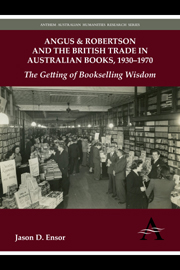 Angus & Robertson and the British Trade in Australian Books, 1930–1970
Angus & Robertson and the British Trade in Australian Books, 1930–1970 Published online by Cambridge University Press: 05 July 2013
It was a staunchly held belief of George Ferguson's that Angus & Robertson could not afford to ‘neglect any reasonable chance’ of selling Australian books overseas, especially in London. MacQuarrie referred to this as Ferguson's ‘overwhelming keenness to sell [his] literary children on this market’. So when long-serving London travelling salesman Sydney A. Sewell returned from a London luncheon with the idea that, through MacQuarrie, Angus & Robertson might take over the Australia House bookstall (located on the Strand) in lieu of developing a new Australia Bookshop, Ferguson replied that he was ‘absolutely all for this’. Having only a ‘grim’ relationship with the current bookstall operator, who occasionally defaulted in paying for stock obtained on credit from the London office, MacQuarrie took the idea to C. L. Hewitt, Official Secretary for Australia in London and made a case that Angus & Robertson's management of the small store at the entrance to Australia House would be of ‘immense propaganda value to the country’. Moreover, it would incorporate a ‘glowing display of all the best and most exciting books published in Australia, and about Australia’.
As a ‘lasting monument to the importance of the Commonwealth and a splendid addition to the architecture of London’, built on what was formerly described as a ‘rustic spot in urban surroundings’, Australia House was Australia's High Commission in the United Kingdom.
To save this book to your Kindle, first ensure [email protected] is added to your Approved Personal Document E-mail List under your Personal Document Settings on the Manage Your Content and Devices page of your Amazon account. Then enter the ‘name’ part of your Kindle email address below. Find out more about saving to your Kindle.
Note you can select to save to either the @free.kindle.com or @kindle.com variations. ‘@free.kindle.com’ emails are free but can only be saved to your device when it is connected to wi-fi. ‘@kindle.com’ emails can be delivered even when you are not connected to wi-fi, but note that service fees apply.
Find out more about the Kindle Personal Document Service.
To save content items to your account, please confirm that you agree to abide by our usage policies. If this is the first time you use this feature, you will be asked to authorise Cambridge Core to connect with your account. Find out more about saving content to Dropbox.
To save content items to your account, please confirm that you agree to abide by our usage policies. If this is the first time you use this feature, you will be asked to authorise Cambridge Core to connect with your account. Find out more about saving content to Google Drive.